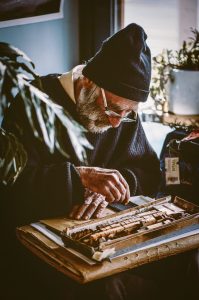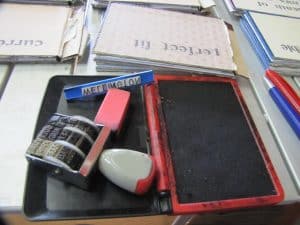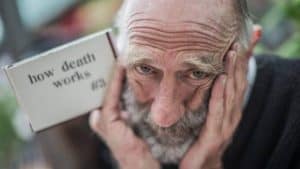The Inside Out, Upside Down, Back to Front World of David Merritt
New Zealand – the hardest country in the world to be a poet? Fellow poet Kirsten Warner puts some questions to the inimitable David Merritt, publisher at Landroverfarm Press…
National Poetry Day is coming up next Friday (August 25) and if there’s one person who takes poetry to the nation it’s David Merritt. He’s seen making his stylish poem books on Auckland’s Karangahape Road, Wellington’s Cuba Street, Dunedin’s George Street and places in between. Inveterate talker and friend, defender of freedom and the word, and a really good poet. Oh, and possibly an introvert – needing regular top-ups of seclusion between bouts of book selling and performing.
 He’s created a small book design that is unmistakably his own – single poems printed on A3 paper between covers made from banana box brown paper, or the deluxe hardcover using recycled Readers Digest books (best use ever).
He’s created a small book design that is unmistakably his own – single poems printed on A3 paper between covers made from banana box brown paper, or the deluxe hardcover using recycled Readers Digest books (best use ever).
It’s an idiosyncratic way of combining recycled materials with missives from the Front, stapled, glued and sometimes held together by rubber bands. Appealing, but you also get that this is an uncompromising stand against the incursions of shit consumerism and bland literature.
Make no mistake, the street poet is a man of sophistication and previous professional lives. He is a constant and engaging poster on Facebook (manager of 11 pages) who doesn’t shy away from a strong opinion, a rave and an occasional rant about political injustice, ravages on our environment, the hardships and inequities of the poetic literary life in this country. Also the joys including his search for the perfect lolly cake: “Bugger poetry. The real money is in celebrity cooking.”
 He manages in a non-polemical way to bring those ideas into his poems and more – he writes tenderly about love, connection and issues of life that all poets grapple with. Recently a couple of new posters of David’s poems were stuck up in the legendary Woodstock (of music festival fame) and other places American by Phantom Billstickers National Poetry Day sponsors Jim and Kelly Wilson (along with posters from other New Zealand poets).
He manages in a non-polemical way to bring those ideas into his poems and more – he writes tenderly about love, connection and issues of life that all poets grapple with. Recently a couple of new posters of David’s poems were stuck up in the legendary Woodstock (of music festival fame) and other places American by Phantom Billstickers National Poetry Day sponsors Jim and Kelly Wilson (along with posters from other New Zealand poets).
Where do you hang out around the country?
I realised early on that I didn’t want to be an “Auckland poet” or a “Dunedin poet” – K. Road seemed a logical place to start, as it’s long been one of the more liberal stretches of public thoroughfare.
Cuba Street and Dixon St and Newtown in Wellington have been the same. In Dunedin I’ll set up shop in George Street or down by the University somewhere. Since the earthquake in Christchurch I’ve mostly been out at Lyttelton where the speed of the community response has been better than most other places and it’s just a great place with lovely supportive people. In Nelson I’m on the main drag just by the Museum. Oamaru – the historic old town quarter. Palmy – outside the Library. New Plymouth – the same. Hamilton – the Library. Wanganui – by the old Post Office.
There are several things to bear in mind when setting up for a street installation – foot traffic, proximity to a toilet, closeness to a good cafe, shelter from the elements, a good bench seat or some steps etc.
I’ve heard you’re going to be on the Interislander on Phantom Billstickers National Poetry Day – what are you up to?
I’m on the ferry with my boxes of poetical tricks its true, but in reality I’m moving up country again to get to the Tauranga Zinefest where I’m running a stall and talking about photocopiers. Meanwhile there are nine boxes of 30 poems in Northland, Auckland, Tauranga, Rotorua, Palmerston North, Wellington, Nelson, Lyttelton and Dunedin that are filling in for me. I like the idea that while I physically always seem to be in transit to somewhere, the boxes of poems can stand in for me during my absences.
You describe yourself as New Zealand’s only professional poet (move over Sam Hunt and the salaried university poets?) How’s it going?
Okay I guess. Eight years ago I was a broken man, living in the wopwops, scratching about in the dirt, farming old land rovers and rehabbing ex-battery farmed hens. I saw my desire to earn a living from poetry as a way to become free of the WINZ world as much as possible.
 The arrival of the rubber-stamp pad alphabet set into my life about nine years ago (for book titles) was the impetus to start making books the way I do and gave me the freedom to be able to create publications more or less on the fly – like an early version of print on demand!
The arrival of the rubber-stamp pad alphabet set into my life about nine years ago (for book titles) was the impetus to start making books the way I do and gave me the freedom to be able to create publications more or less on the fly – like an early version of print on demand!
It’s hard obviously but I’ve always had a very long term view of my writing career – that I may not earn or even deserve success or recognition until I were an old man. It’s meant I’ve stayed away from the ‘normal’ career things – the creative writing courses, the bookshop sales – and been fiercely independent about how I make and sell.
It was all about showing people that poets don’t have to be hidden from view in universities, that they can publicly work long hours at (much) less than minimum pay. Eventually you earn some respect from those that have seen you at it week in month out for years.
You’ve got to have a small modicum of talent and have some poems that resonate with folk. Some days I still feel like an idiot doing it so hard, especially when I watch other poets follow the conventional path and be showered with grants/residencies/recognition.
They say that success too easily obtained is also very easily lost so I can’t complain really (although I do moan quite a bit about stuff). When I first started doing poetry the way I do now I thought (naively as it turned out), that Creative New Zealand would take notice of what I was doing and offer me some small encouragement.
Nothing could really be further from the truth – in almost a decade now I have not had a kind word from any one of the high-salaried ‘advisors’ at CNZ. And not once have I met a tutor from a creative writing course who has gone out of their way to see what makes me tick. I meet their students all the time and they are fascinated by the possible business model I represent….
Can you tell us about the life of the professional poet? You have a travelling life and a home life, how do you balance them?
Sigh! I don’t…. I’m on the never-ending tour pretty much most of the time now. A 1974 LWB Landrover was my home, office, kitchen, bedroom and point of sale display unit! My place in the wopwops has gone now due to some chicanery from that festival that was held where I used to live. It was quite a blow after being there for 10 years…. one I’m still trying to work out.
The balancing act is really about cutting your cloth to suit. You can’t afford to get trapped into the high-rent, urban lifestyle. You’d grow your own food as much as possible, live off the grid and just make do. Clearly I’m over owning houses and mortgages. I’m pretty cheap to run I know that. At the moment I’m in a basement in Picton, with access to gardens and hens (and electricity and wifi!)
I used to think that there was no off-switch, that you’re a poet for every waking moment of your life. But recently I’ve realised that there’s no off-switch even when you’re asleep and dreaming, that you’re a poet for all time. You can’t do nine to five or leave it behind on holidays, it’s all-consuming 24-7 and this doesn’t end till death!
Where and when does poetry happen for you? And why – what’s the urge? When did you start writing poetry? Can you share your first poem with our new writers and trace your work from that genesis?
 Woah! Slow down! As a younger poet I found it much easier to write poems than I do now… I just wait for things to strike me or a memory to float to the surface or something to trigger something. I don’t sit at a desk for five hours a day forcing myself to ‘create’.
Woah! Slow down! As a younger poet I found it much easier to write poems than I do now… I just wait for things to strike me or a memory to float to the surface or something to trigger something. I don’t sit at a desk for five hours a day forcing myself to ‘create’.
The urge has always been to make some sense of the mystery of everyday life – our emotions and feelings in particular. I’ve always tried to treat all emotions as equal and not shy off from feeling things. I’ve never “hardened up” for example and have tried not to desensitise myself by wholesale exposure to horror or violence or crap on big screens or DVDs. Ugh!
I started writing poetry in 1986 when I moved to Dunedin after being involved in the music industry as a band and tour manager. I was tired of looking after other people’s creativity and headed south from Auckland.
Here’s your poem.
Leah’s Dream
She rings early at seven to tell me
I’m a people’s poet and
don’t rush into publishing
and you’re on your way.
Don’t aim for two years time
but aim for when you’re 58.
It’s a lifelong process, no hurry,
don’t force anything,
learn from being a father and
write for their generation.
Poetry isn’t just
something to say
but a way of saying it,
describing the particular
you give us the universal.
This poem is based on a true phone call I received soon after the birth of my first son, Hamish Maku, from Leah Poulson a Dunedin playwright. It was the most prophetic thing. She’d had a dream where I’d struggled all my life and only achieved a measure of success towards the end of my life (I’m 58 now). I would not have done it any differently. I’ve always known that too much money corrupts and I’ve always wanted to be a voice of everyday folk
Where does your support come from?
Hell, my popularity is mostly based on a lot of hard work and a lot of help from friends/mates/acquaintances up and down the country. I’ve a huge network of people that help – like the Methodist Church in Auckland who have given me use of a workshop, Phantom Billstickers obviously, Dennis Thorpe for the videos of the live shows. I’ve collaborated with a lot of musicians over the years. By making my words copy left I’ve made my work deliberately available to musicians all over the world. I’m a poet FFS, not a Hollywood film studio or a multinational record company. I want my words to become bit torrents! I’ve been waiting nine years for some other idiot to turn up on a bench and start working alongside me. I only meet other poets at the Zinefests or readings.
Have you thought about learning Spanish and moving to South America to be a rock star poet?
Heck yes but I’ve stayed in New Zealand all my life because I’ve never thought you had a true voice as a Kiwi once you’d lived a big chunk of your life overseas. Globalism homogenises voices and I’m fiercely nationalistic of this lovely country and our unique way of looking at things. This is the hardest country in the world to be a poet in obviously – we have hardly any culture of spoken word here really – not compared to say Iran or Turkey or Spain.
And because I’m avowedly political I fit more into the framework of poets around the world who are using poetry to try and bring about social and political change. I often find myself saying that there are no such things as stadium poets – the mere fact that I can now make a modest living from poetry in NZ is rock star poet enough for me.
Check out some of David Merritt’s work here:
For David Merritt poem performance
https://www.youtube.com/watch?v=RHUn7U3zhRs
https://www.youtube.com/watch?v=1TgVOsEwpSc
Facebook
https://www.facebook.com/dmpexperience/
https://www.facebook.com/lrfpress/
https://www.facebook.com/dm807169
Poster poems
https://www.facebook.com/PosterPoem/photos/a.120633531298719.15866.105665726128833/1783086718386717/?type=3&theater
https://www.facebook.com/sleepuphill/photos/a.1822848641301715.1073741828.1820405294879383/1886979334888645/?type=3&theater
There’s a big calendar of events happening next Friday August 25 on Phantom Billstickers National Poetry Day, catch one in your town:
http://www.nzbookawards.nz/national-poetry-day/2017-national-poetry-day/
Kirsten Warner
You can catch Kirsten Warner at the Golden Dawn
- Civil War – Dir: Alex Garland (Film Review) - April 9, 2024
- Pearl Jam – Dark Matter (Monkeywrench/Republic) Album Review - April 1, 2024
- Blonde Redhead – New Zealand Tour 2024 - March 14, 2024
